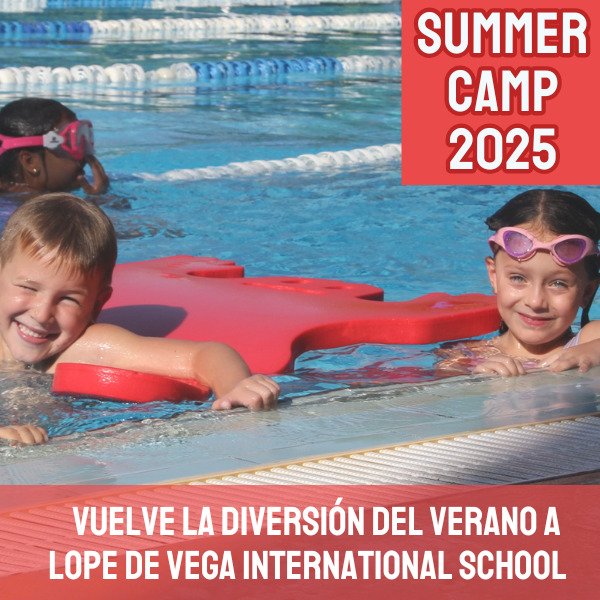Professional
Certificates
Professional
Certificates
Professional Certificates
Professional Certificates
____________
As a LABORA Collaborating Centre (Public Employment and Training Service of the Valencian Community Region) we teach official certificates of professionalism that qualify for employment;
These are official qualifications that are valid in the European Union and throughout the national territory, so they will be the only ones that will enable them to work in the near future;
Certificates of professionalism that the Lope de Vega currently offers:
Training monitor
in Multipurpose Hall and personal training
_______________________
This certificate has a total of 590 hours of training. Classes are held from Monday to Friday, in the afternoons, in the complete sports facilities of the Lope de Vega. These include a fully equipped gymnasium, spinning room, semi-Olympic indoor heated swimming pool and various courts among other facilities.
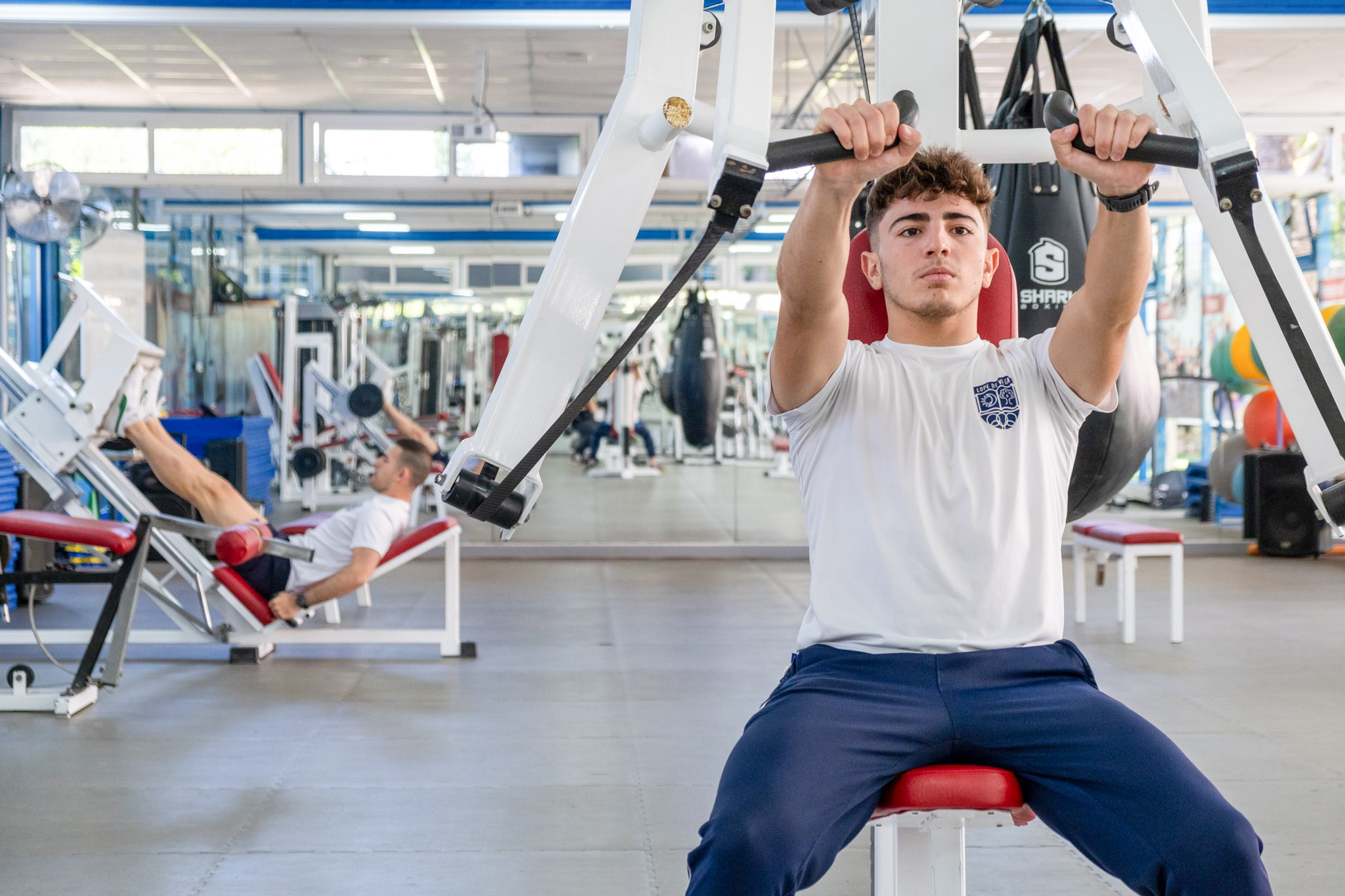
The professional opportunities for which the Certificate of professionalism of Monitor of training in Multipurpose Hall and personal training enables you are:
-
Monitor and/or trainer in a gymnasium.
-
Physical trainer.
-
Personal trainer.
-
Animator and/or promoter of physical fitness activities.
-
Coordinator of fitness activities.
-
Support technician in the physical preparation of sportsmen and women.
The certificate of professionalism of Monitor of training in Multipurpose Hall and personal training is a level 3 course, so to access it is necessary to have:
- Baccalaureate degree.
- Another Certificate of Professionalism of the same level or level 2 of the same professional family and area.
- Higher Vocational Training, Vocational Training Technician or Higher Technician in Plastic Arts and Design.
- Entrance exam to higher level training cycles.
- University entrance exam for people over 25 or 45 years of age.
As this is a classroom course held at the Lope de Vega facilities, you will have at your disposal:
- Heated semi-Olympic swimming pool.
- Changing rooms with lockers.
- Complete sports facilities to complete training sessions.
- Smart classrooms with interactive whiteboards.
- Parking area within the facilities.
- Cafeteria
- Library
- WIFI Campus with Internet connection in all facilities.
sports technician
in mid-mountain (levels I and II)
_______________________
The First Level Mountain Sports Technician certificate certifies that you have the necessary competences to perform the initiation in the fundamentals of mountaineering; This is a very new modality that still has few professionals, so the labour insertion rate is 100%;
The Mid Mountain qualification is issued by the Ministry of Education, which gives it an official status compared to the various sports courses that are currently offered;
This course, for which enrolment is already open, can be taken by those who have the ESO diploma.
Course fee.
– If the registration is made before 31 August: 1000 €.
– Registration from 1 September: 1175 €.
To benefit from the discount on the course, registration for the specific entrance exam must be made at the College Offices before 31 August from 8:30 am to 7 pm.
The following documents must be submitted: 2 passport-size photos, certified photocopy of ID card, official medical certificate, certified photocopy of academic qualification and €60 to register for the test.
The official qualification that will set you apart from the rest!
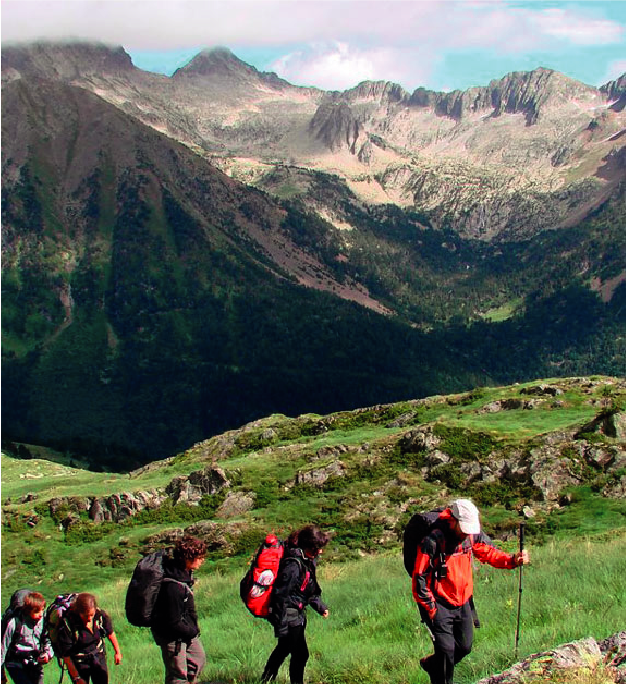
- Progress safely and efficiently on trails in medium mountain terrain.
- Snowshoeing in snowy, Nordic-type terrain.
- Establish the action plan for the development of mountain activities in order to achieve the proposed sporting objective, guaranteeing safety conditions, in accordance with the physical condition and interests of the participants.
- Control the logistics of the activity and ensure the availability of the provision of all necessary services.
- Assess the possibilities of carrying out the activity in the chosen location.
- Determine the location of the overnight stay based on safety criteria and the schedule of the activity to be carried out.
- Organise the practice of mountaineering in order to achieve the proposed sporting objective, guaranteeing the safety of the participants.
- Guiding individuals or groups in low and medium mountain terrain.
- Prepare and plot routes on maps and follow the same route on the ground with or without visibility conditions, and regardless of terrain conditions.
- Perform mountaineering instruction, using appropriate equipment and material, demonstrating sporting movements and gestures according to a reference model.
- Evaluate the progression of sport learning, identifying performance errors, their causes and applying the necessary methods and means for their correction.
- Access meteorological information sources and interpret the information obtained.
- Anticipate and identify weather changes in an area by observing local meteors.
- Predicting the evolution of atmospheric weather by analysing a weather map.
- Forecast the evolution of the terrain according to weather conditions.
- Collaborate in the promotion of the cultural heritage of mountain areas and the conservation of wild nature.
- Identify weather changes in an area by observing local meteors.
- Predict weather changes by analysing a weather map.
- Detect technical information related to their work, in order to incorporate techniques and trends, and to use new equipment and materials in the sector.
- Detect and interpret the technological, organisational, economic and social changes that affect professional activity.
- Have a global and integrated vision of the process, understanding the function of the installations and equipment, and the technical, pedagogical, organisational, economic and human dimensions of their work.
Training Plan Level 1 (420h)
Common block
- Anatomical and physiological basis of sport
- Psychopedagogical bases of teaching and training.
- Sports training.
- Sociological foundations of sport.
- Organisation and legislation of sport.
- First aid and hygiene in sport.
Specific block
- Professional development.
- Technical mountaineering training.
- Mountain environment.
- Safety in mountaineering.
Complementary block.
Practical training block.
Training Plan Level 2 (555h)
Common block:
- Anatomical and physiological basis of sport II.
- Psychopedagogical bases of teaching and training II.
- Sports training II.
- Organisation and legislation of sport II;
- Theory and sociology of sport;
Specific block:
- Driving in the middle mountains
- Professional development of the Technician of the speciality
- Mountaineering training
- Technical training in mountain progression
- Mountain environment II
- Safety of the sport mode
Complementary block.
Practical training block.
entities/companies in which to carry out their functions
- Sports schools;
- Sports clubs or associations;
- Mountain sports and climbing federations;
- Sporting patronages;
- Sports services companies;
- Schools (extracurricular activities);
OUTINGS LEVEL I
This technician will work in the field of sports initiation, developing teaching-learning sessions with athletes;
It is expressly excluded from its scope of action: Snowy mountain terrain and activities that require for progression the use of ropes, techniques and materials specific to climbing, mountaineering, canyoning or ski mountaineering. Teaching mountaineering, canyoning, climbing, ski mountaineering;
This technician will always work within a public or private organisation related to mountaineering;
LEVEL II DEPARTURES
This technician will work in the field of driving and accompaniment in low and medium mountains and the organisation of mountaineering activities; Se excluyen expresamente de su ámbito de actuación los glaciares y terrenos que necesitan para la progresión el empleo de técnicas y la utilización de material de alpinismo, escalada, esquí o descenso de barrancos.
This qualification accredits the acquisition of sufficient professional knowledge and skills to take on responsibilities independently or within a public body or private company;
- Preparation for the entrance exam to higher cycles.
- Another intermediate vocational training cycle.
- The Baccalaureate in any of its modalities.
sports technician
in horseriding: endurance, orienteering
and equestrian tourism
_______________________
The Sports Technician in Routes, Orientation and Equestrian Tourism is one of the modalities available in sports education with which you can obtain the Intermediate Degree; By taking this course you will get an official academic qualification;
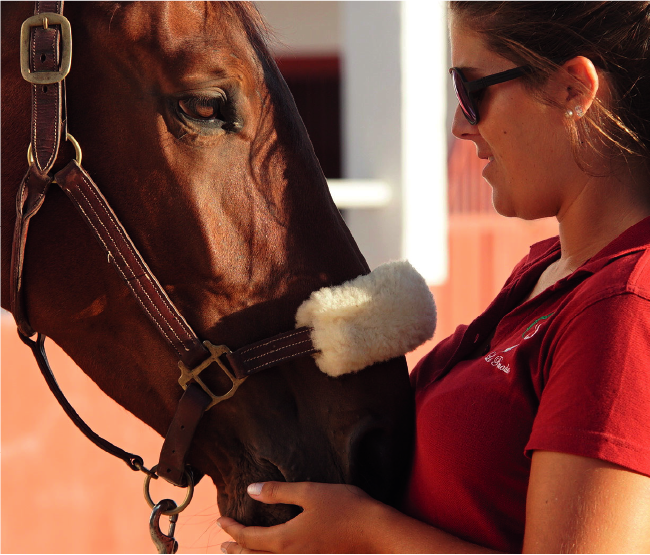
Once you have passed the initial cycle you will be able to:
- To stimulate, instruct and implement the introduction to the sport of horse-riding;
- To organise, accompany and mentor athletes during their participation in activities, competitions and events at this level,
- Guiding users on horseback over varied terrain;
On completion of the final cycle you will be able to:
- Adapt, direct and dynamise the basic training and technical improvement of riders and horses at the stage of equestrian sports technification in the equestrian disciplines of raid and trec;
- To organise, accompany and supervise sportsmen and sportswomen during their participation in activities, competitions and events at this level;
- Manage the necessary material resources and coordinate the activities of the technicians in charge;
- Organise activities, competitions and events at the introductory level of sport;
- Determine and design itineraries and lead sportsmen and women and users along equestrian routes in the natural environment.
- To specify, direct and adapt riding activities for riders with disabilities;
- Collaborate in the process of detection and selection of sporting talent (rider-horse pairs).
The courses leading to the title of Sports Technician in the Equestrian Disciplines of Endurance, Orienteering and Equestrian Tourism are organised in two cycles:
- Initial intermediate cycle in Equestrian Studies, with a duration of 620 hours.
- Final intermediate cycle in the equestrian disciplines of Endurance, Orienteering and Equestrian Tourism, lasting 660 hours.
To access the initial intermediate cycle it is necessary to have the Compulsory Secondary Education Graduate or equivalent for access purposes.
In addition, in order to gain access to the initial intermediate cycle, it is necessary to pass a specific test in which the applicant demonstrates his/her basic technical mastery of the speciality.
It will be possible to enter the initial intermediate cycle without the Compulsory Secondary Education Graduate qualification, provided that you are 17 years old, you pass the specific test and an entrance exam to the initial intermediate cycle.
To access the final cycle of the intermediate level, it is necessary to accredit having passed the initial cycle of the intermediate level.
- Introductory riding instructor.
- Trainer for beginners in equestrian competition.
- Driver for horseback riding itineraries on varied terrain;
- Technification trainer in raid, trec and equestrian tourism;
- Equestrian tourism instructor-guide;
- Co-ordinator of other equestrian initiation technicians;
- Manager and organiser of promotional and initiation equestrian events;
- Course designer for technical endurance races;
- Designer of long distance equestrian routes;
sports technician
in equestrianism: jumping, dressage
and full competition
_______________________
The Sport Technician in Equestrian Sports: Show Jumping, Dressage and Eventing offers the possibility of obtaining the intermediate level qualification and, once this has been passed, the higher level qualification; After completing this cycle you will obtain your official academic qualification;

Once you have passed the initial cycle you will be able to:
- To stimulate, instruct and implement the introduction to the sport of horse-riding;
- To organise, accompany and mentor athletes during their participation in activities, competitions and events at this level,
- Guiding users on horseback over varied terrain;
On completion of the final cycle you will be able to:
- Adapt, direct and dynamise the basic training and technical improvement of riders and horses at the stage of equestrian sports technification in the equestrian disciplines of jumping, dressage and eventing;
- To organise, accompany and mentor athletes during their participation in activities, competitions and events at this level;
- Manage the necessary material resources and coordinate the activities of the technicians in charge;
- Organise activities, competitions and events at the introductory level of sport;
- Designing routes and circuits at their level;
- To specify, direct and adapt riding activities for riders with disabilities;
- Collaborate in the process of detection and selection of sporting talent (rider-horse pairs).
Modules of the specific block initial cycle TD in Riding
- Transport and physical maintenance of the horse on the ground.
- Hippology;
- Methodology of equestrian education;
- Accompaniment on horseback routes;
- Equestrian events;
- Practical training.
Modules of the specific block of the final cycle, Endurance, Orientation and Equestrian Tourism
- Equestrian education and training;
- Bases of the sport training of the horse;
- Physical preparation of the rider;
- Para-equator.
- Organisation of equestrian events;
- Technical improvement in raid;
- Technical improvement in trec.
- Organisation of equestrian itineraries;
- Natural environment;
- Practical training.
The courses leading to the title of sports technician in Show Jumping, Dressage and Eventing are organised in two cycles:
- Initial intermediate cycle in Equestrian Studies: duration of 620 hours.
- Final intermediate cycle in the disciplines of Show Jumping, Dressage and Eventing: duration of 830 hours.
In order to access the initial intermediate cycle it is necessary to have the Compulsory Secondary Education Graduate or equivalent for access purposes;
In addition, in order to gain access to the initial intermediate cycle, it is necessary to pass a specific test in which the applicant demonstrates his/her basic technical mastery of the speciality.
It will be possible to enter the initial intermediate cycle without the Compulsory Secondary Education Graduate qualification, provided that you are 17 years old, you pass the specific test and an entrance exam to the initial intermediate cycle.
In order to access the final intermediate level cycle, it is necessary to accredit having passed the initial intermediate level cycle and to pass a specific test in which the applicant demonstrates his/her specific technical mastery in the modality;
- Introductory riding instructor.
- Trainer for beginners in equestrian competition.
- Driver for horseback riding itineraries on varied terrain;
- Technification trainer in show jumping, dressage and eventing.
- Co-ordinator of other equestrian initiation technicians;
- Manager and organiser of promotional and initiation equestrian events;
- Course designer and technical reprises.
sports technician
in basketball (levels I and II)
_______________________
If your passion is basketball and you have always felt more like a coach than a player, this is the Cycle for you. You will be able to work as a basketball trainer/monitor in sports schools, clubs, federations, boards of trustees, etc.
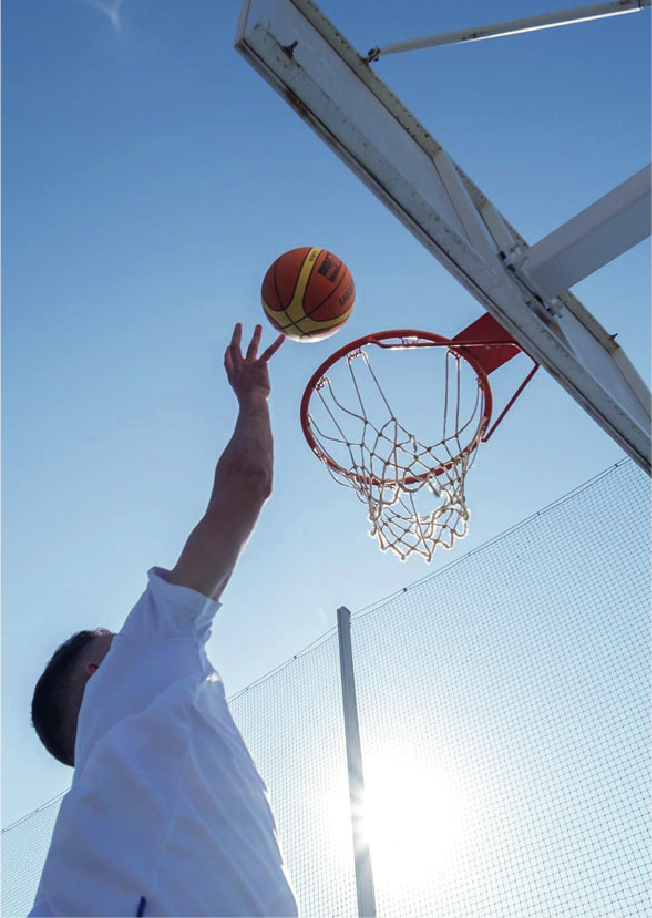
- Carry out the teaching of basketball, following the objectives, contents, resources and evaluation methods, according to the general programming of the activity.
- Instruct students in basic basketball techniques and tactics.
- Evaluate at their level the learning progression, identify technical and tactical execution errors of the athletes and correct them;
- To teach the use of the specific facilities of the basketball courts;
- To inform about the appropriate clothing for the practice of this sport;
- Selecting, preparing and supervising teaching materials.
- Exercising control of the group, bringing cohesion and dynamism to the activity;
- To teach and enforce the basic rules of basketball;
- Motivate students in technical progress and improvement of physical condition;
- Transmit to sportsmen and women the rules, values and ethical content of sports practice;
- To introduce sportsmen and women to healthy sports practice;
- Prevent the most common injuries;
- Apply emergency assistance if necessary, following protocols and guidelines.
- Monitor the availability of existing health care;
- Organise the transfer of the sick or injured person, in case of emergency;
- Collaborate with the medical assistance services of the sports facility;
The first level enables students to learn the fundamental principles of basketball and to promote this sport;
Entry requirements;
Holding the Compulsory Secondary Education Graduate Certificate, or equivalent for academic purposes, and passing the practical entrance exam;
Duration
380 hours
(230 in the school and 150 in a workplace)
Syllabus
Common block
• Anatomical and physiological basis of sport
• Psychopedagogical bases of teaching and learning;
training
• Sports training
• Sociological foundations of sport
• Organisation and legislation of sport
• First aid and hygiene in sport
Specific block
• Individual and collective technical-tactical actions of the game
• Rules of the game
• Team management
• Methodology of teaching and training of
basketball
• Basketball training planning and evaluation
• Applied physical preparation
• Sports security
Complementary block
Practical training block
The second level enables you to teach and train athletes of intermediate categories with the aim of perfecting their technical and tactical execution.
Entry requirements;
To have passed level I of Basketball Sport Technician.
Duration
610 hours
(410 in the school and 200 in a workplace).
Study plan
Common block
• Anatomical and physiological basis of sport
• Psycho-pedagogical bases of teaching and training
• Sports training
• Organisation and legislation of sport
• First aid and hygiene in sport
• Theory and sociology of sport
Specific block
• Individual technical-tactical actions of the game II
• Collective technical-tactical actions of the game II
• Game systems
• Rules of the game
• Team management
• Party address
• Basketball teaching and coaching methodology
• Basketball training planning and evaluation
• Talent detection and selection
• Observation of the game
• Applied physical preparation
• Applied psychology
Complementary block
Practical training block
- Student Residence
- Computer classrooms
- Closed circuit TV and security service.
- Multimedia Assembly Hall
- Cafeteria and Dining Room
- Library and Documentation Centre
- Own kitchen. Two dining rooms
- 16 Sports Schools
- basketball and volleyball courts, gymnasium, multi-sports courts, 3 8-a-side football pitches and an 11-a-side football pitch, tennis courts, paddle courts, etc.
- Heated semi-Olympic swimming pool.
- Smart classrooms with interactive whiteboards.
- WIFI Campus with Internet connection in all facilities.
This technician will work in the area of basketball initiation, always reporting to a technician of a higher level than him/her, within a sports entity related to this sport. You will be able to carry out your duties in:
- Schools and sports initiation centres;
- Sports clubs or associations;
- Basketball federations;
- Public sports boards or services;
- Sports services companies;
- Schools (in extracurricular activities);
You will be able to develop your training career:
- Middle grade:
- The Initial Cycle (I) leads to the Initial Certificate;
- With the Initial Cycle (II) you obtain the title of Basketball Sports Technician
- Higher Grade:
- Level III, provides the title of Superior Sports Technician in Basketball
Training monitor
in Multi-purpose room and personal training
This certificate has a total of 590 hours of training. Classes are held from Monday to Friday, in the afternoons, in the complete sports facilities of the Lope de Vega. These include a fully equipped gymnasium, spinning room, semi-Olympic indoor heated swimming pool and various courts among other facilities.
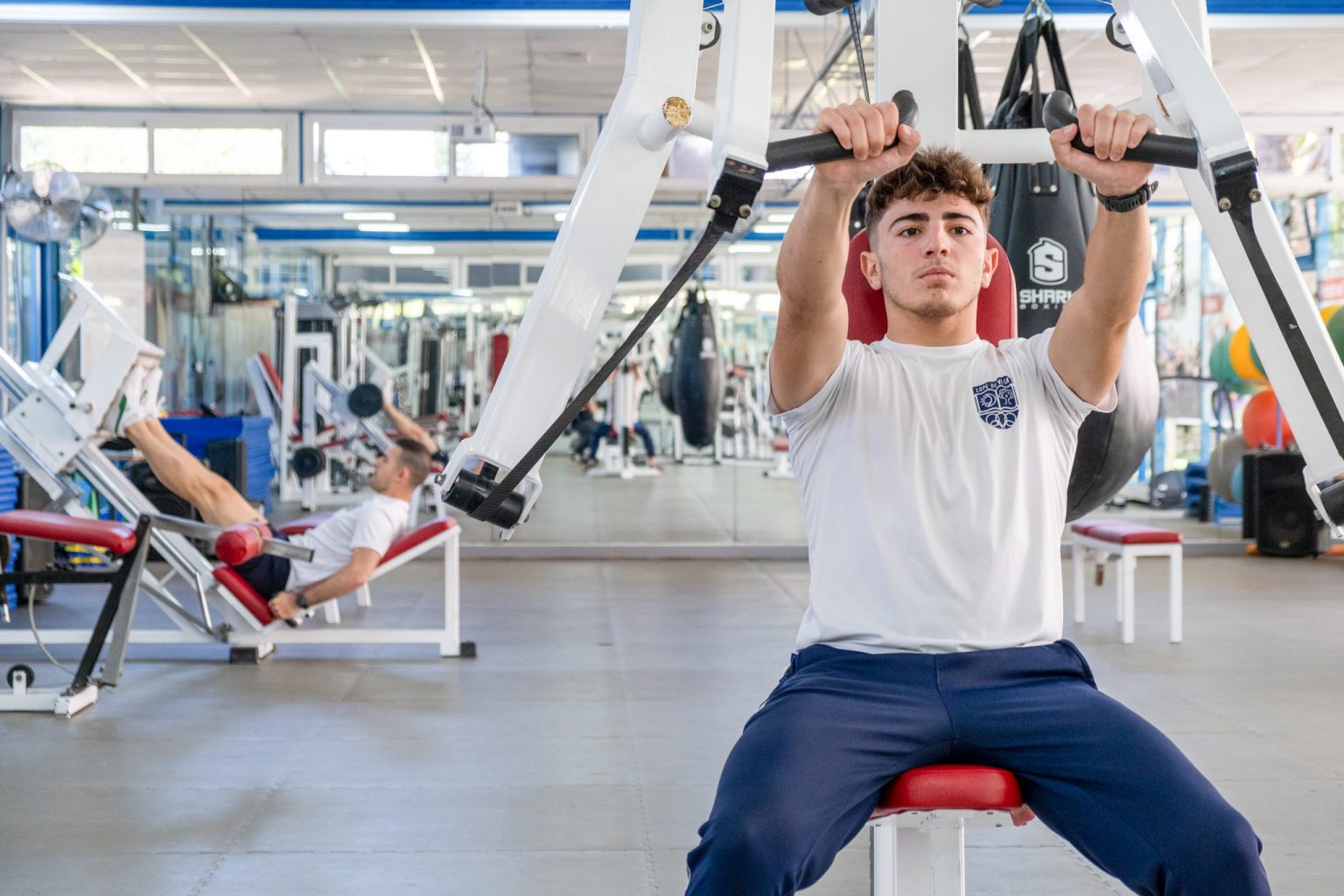
Training monitor
in multipurpose room and personal training
This certificate has a total of 590 hours of training. Classes are held from Monday to Friday, in the afternoons, in the complete sports facilities of the Lope de Vega. These include a fully equipped gymnasium, spinning room, semi-Olympic indoor heated swimming pool and various courts among other facilities.

The professional opportunities for which the Certificate of professionalism of Monitor of training in Multipurpose Hall and personal training enables you are:
-
Monitor and/or trainer in a gymnasium.
-
Physical trainer.
-
Personal trainer.
-
Animator and/or promoter of physical fitness activities.
-
Coordinator of fitness activities.
-
Support technician in the physical preparation of sportsmen and women.
The certificate of professionalism of Monitor of training in Multipurpose Hall and personal training is a level 3 course, so to access it is necessary to have:
- Baccalaureate degree.
- Another Certificate of Professionalism of the same level or level 2 of the same professional family and area.
- Higher Vocational Training, Vocational Training Technician or Higher Technician in Plastic Arts and Design.
- Entrance exam to higher level training cycles.
- University entrance exam for people over 25 or 45 years of age.
As this is a classroom course held at the Lope de Vega facilities, you will have at your disposal:
- Heated semi-Olympic swimming pool.
- Changing rooms with lockers.
- Complete sports facilities to complete training sessions.
- Smart classrooms with interactive whiteboards.
- Parking area within the facilities.
- Cafeteria
- Library
- WIFI Campus with Internet connection in all facilities.
Lifeguarding
in Aquatic Facilities
This certificate has a total of 300 hours of training. Classes are held from Monday to Friday, in the afternoons, in the complete sports facilities of the Lope de Vega. They have an indoor heated semi-Olympic swimming pool.
Our programme, divided into theoretical and practical modules, guarantees a complete immersion in the world of lifeguarding, from the basic fundamentals to the most advanced life-saving techniques.
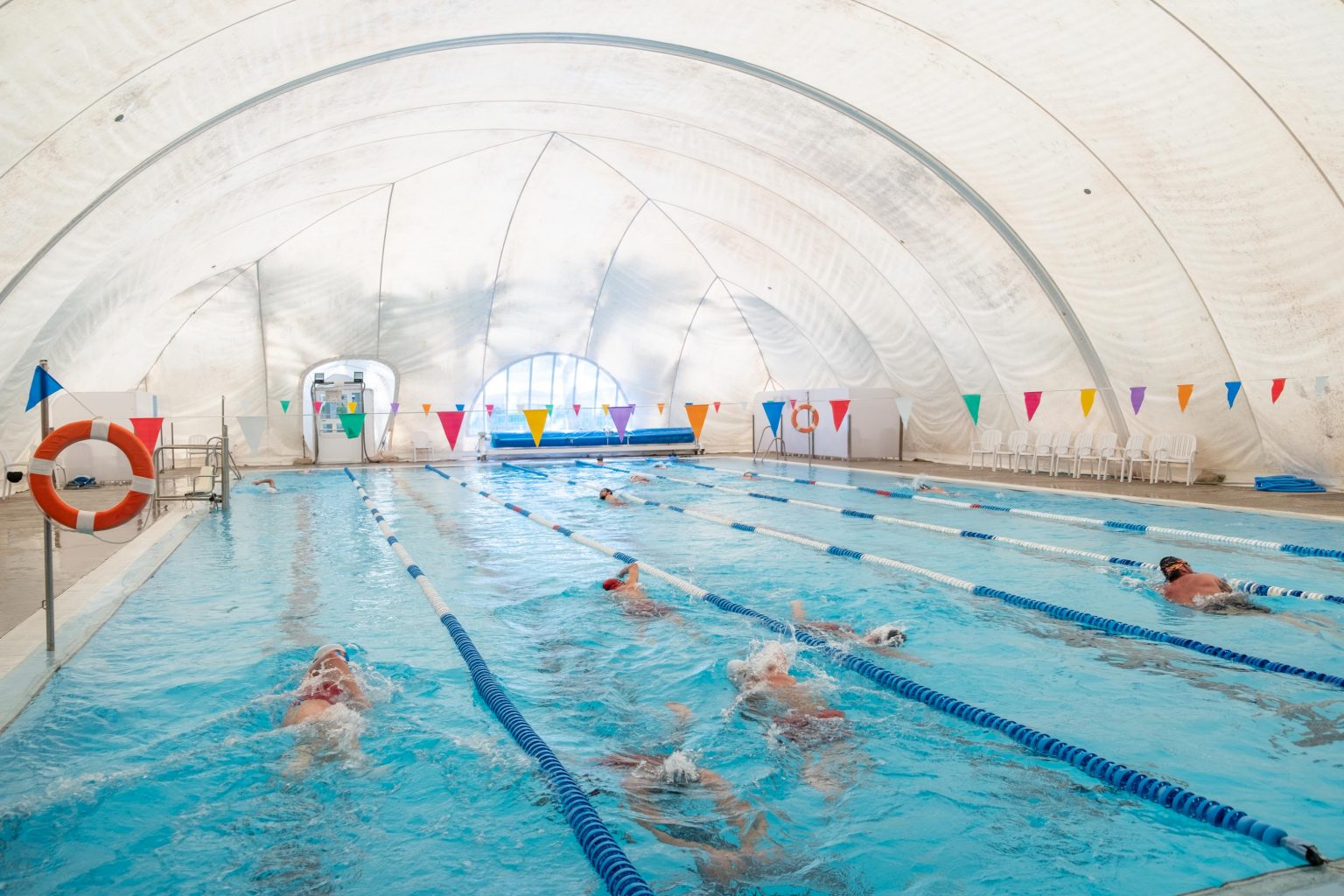
Lifeguarding
in Aquatic Facilities
This certificate has a total of 300 hours of training. Classes are held from Monday to Friday, in the afternoons, in the complete sports facilities of the Lope de Vega. They have an indoor heated semi-Olympic swimming pool.
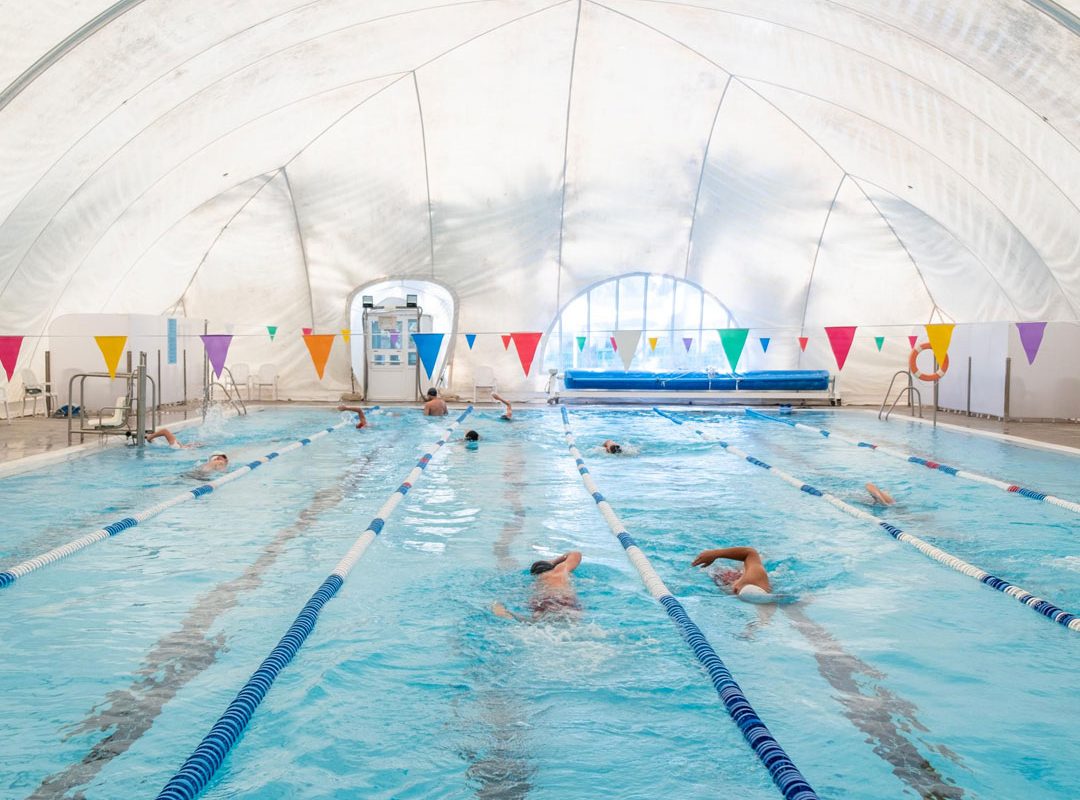
The career opportunities for which the Certificate of Professionalism in Lifeguarding in Aquatic Facilities qualifies you are:
- Swimming pool lifeguard;
- Lifeguard in water parks;
- Lifeguard in natural swimming pools;
The certificate of professionalism of Lifeguarding in Aquatic Facilities is a level 2 course, so in order to access it it is necessary to have the following qualifications:
- ESO diploma;
- Another Certificate of Professionalism of the same level or level 1 of the same family and professional area;
- Basic VET Diploma, VET Technician or Plastic Arts and Design Technician;
- Entrance exam to intermediate level training cycles.university entrance exam for people over 25 years old or 45 years old.
As this is a classroom course held at the Lope de Vega facilities, you will have at your disposal:
- Heated semi-Olympic swimming pool.
- Changing rooms with lockers.
- Complete sports facilities to complete training sessions.
- Smart classrooms with interactive whiteboards.
- Parking area within the facilities.
- Cafeteria
- Library
- WIFI Campus with Internet connection in all facilities.
Guide for dry or aquatic
Canyons
This certificate has a total of 660 hours of training. Classes are given from Monday to Friday, in the afternoons and practice in the mornings, in the complete sports facilities of Lope de Vega and in the canyons approved for this purpose.
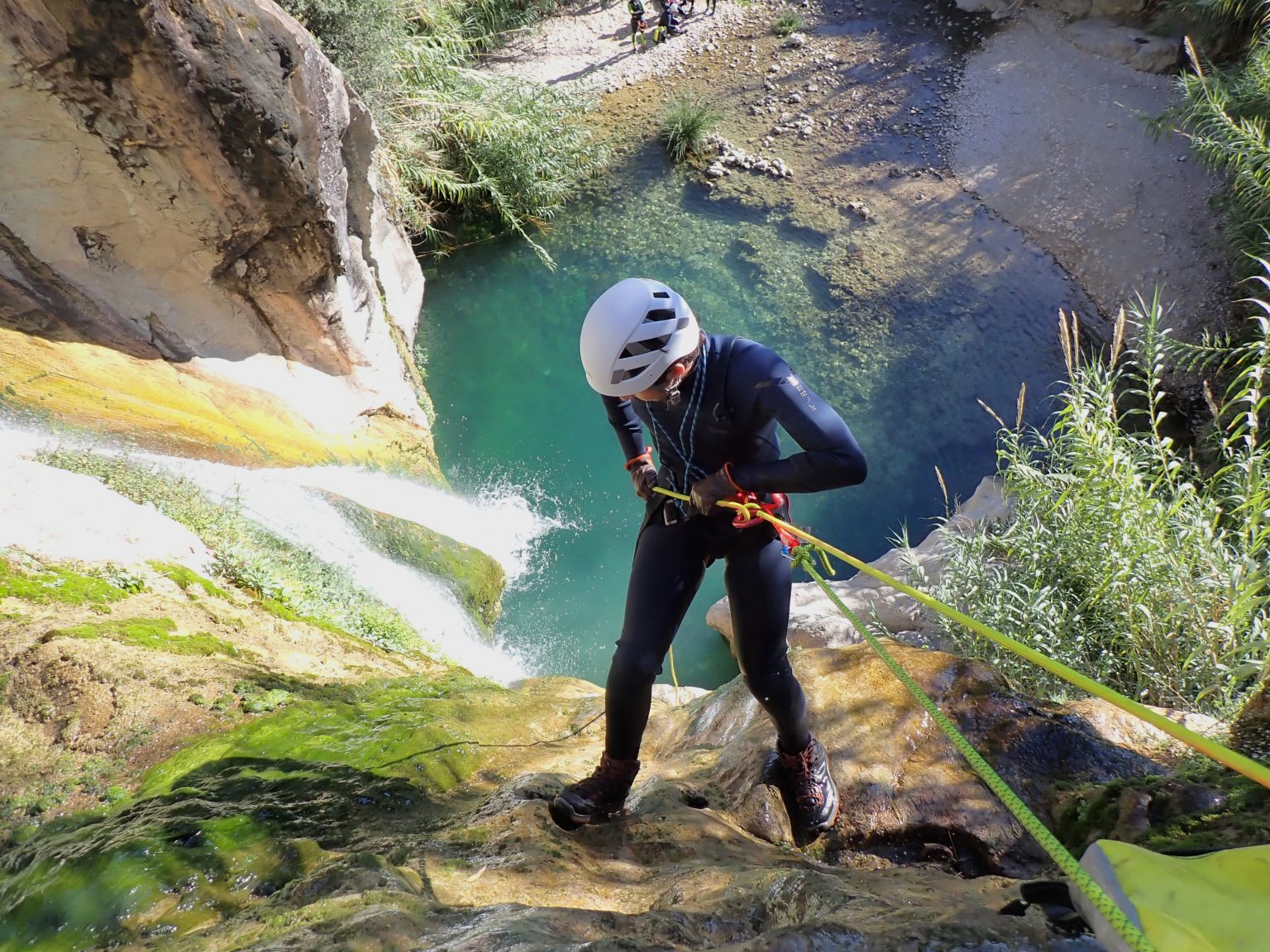
Guide for dry or aquatic
Canyons
This certificate has a total of 660 hours of training. Classes are given from Monday to Friday, in the afternoons and practice in the mornings, in the complete sports facilities of Lope de Vega, equipped with facilities and in the canyons approved for this purpose.
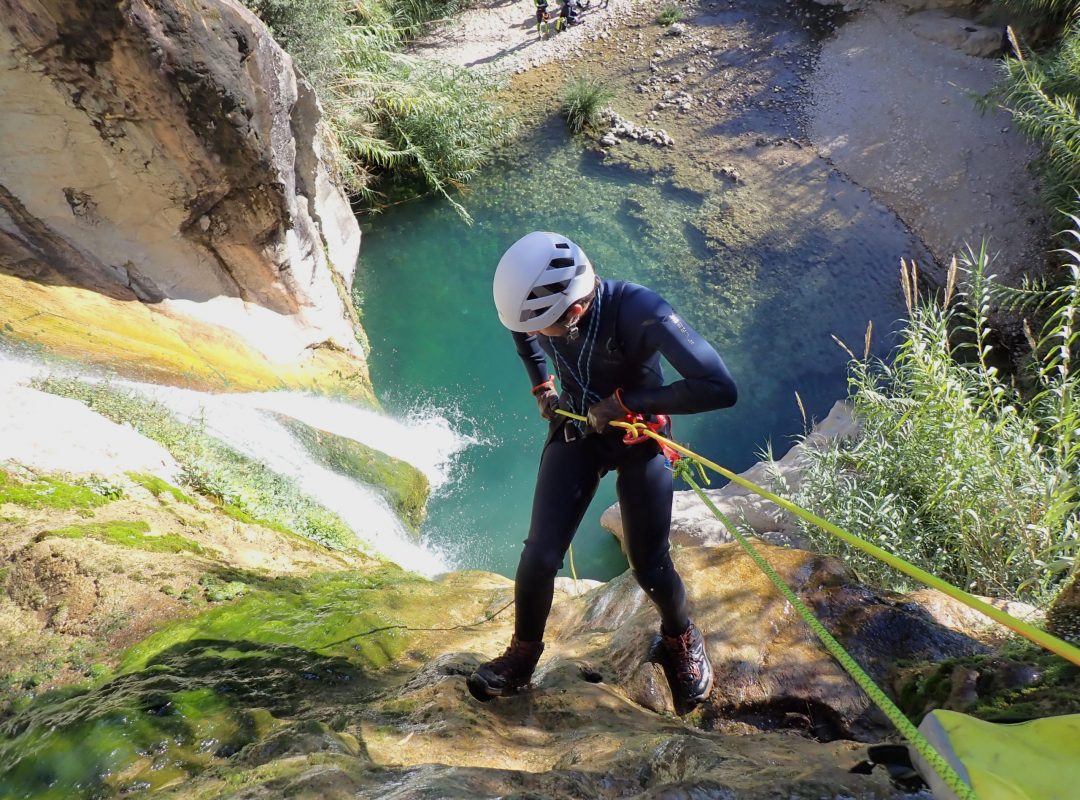
The professional outings for which the Certificate of professionalism of Guide for dry or aquatic canyons qualifies you are:
- Monitor in camps.
- Guide in canyoning activities.
- Canyoning routes outfitter.
- Maintenance of abseiling and handrail installations in canyons.
- Designer of terrestrial itineraries up to mid-mountain.
The certificate of professionalism of Lifeguarding in Aquatic Facilities is a level 2 course, so in order to access it it is necessary to have the following qualifications:
- ESO diploma;
- Another Certificate of Professionalism of the same level or level 1 of the same family and professional area;
- Basic VET Diploma, VET Technician or Plastic Arts and Design Technician;
- Entrance exam to intermediate level training cycles.university entrance exam for people over 25 years old or 45 years old.
As this is a classroom course held at the Lope de Vega facilities, you will have at your disposal:
- Heated semi-Olympic swimming pool.
- Changing rooms with lockers.
- Complete sports facilities to complete training sessions.
- Smart classrooms with interactive whiteboards.
- Parking area within the facilities.
- Cafeteria
- Library
- WIFI Campus with Internet connection in all facilities.
- Approved canyoning
- Climbing wall
Itinerary guide
low and medium mountain
This certificate has a total of 610 hours of training. Classes are given from Monday to Friday, in the afternoons and practice in the mornings, in the complete sports facilities of Lope de Vega and in mountainous areas approved for this purpose.
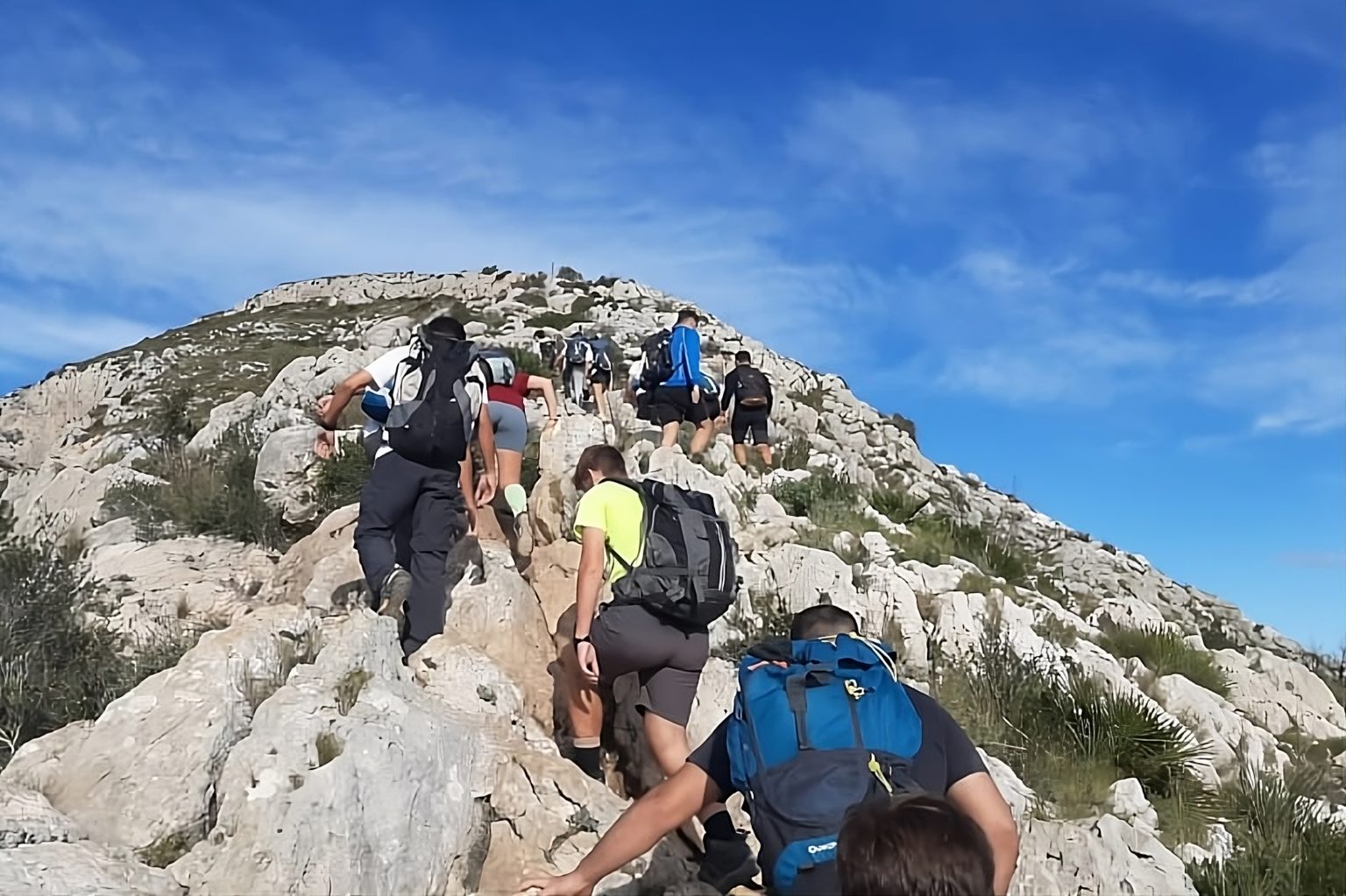
Itinerary guide
low and medium mountain
This certificate has a total of 610 hours of training. Classes are given from Monday to Friday, in the afternoons and practice in the mornings, in the complete sports facilities of Lope de Vega, equipped with facilities and in mountainous areas approved for this purpose.
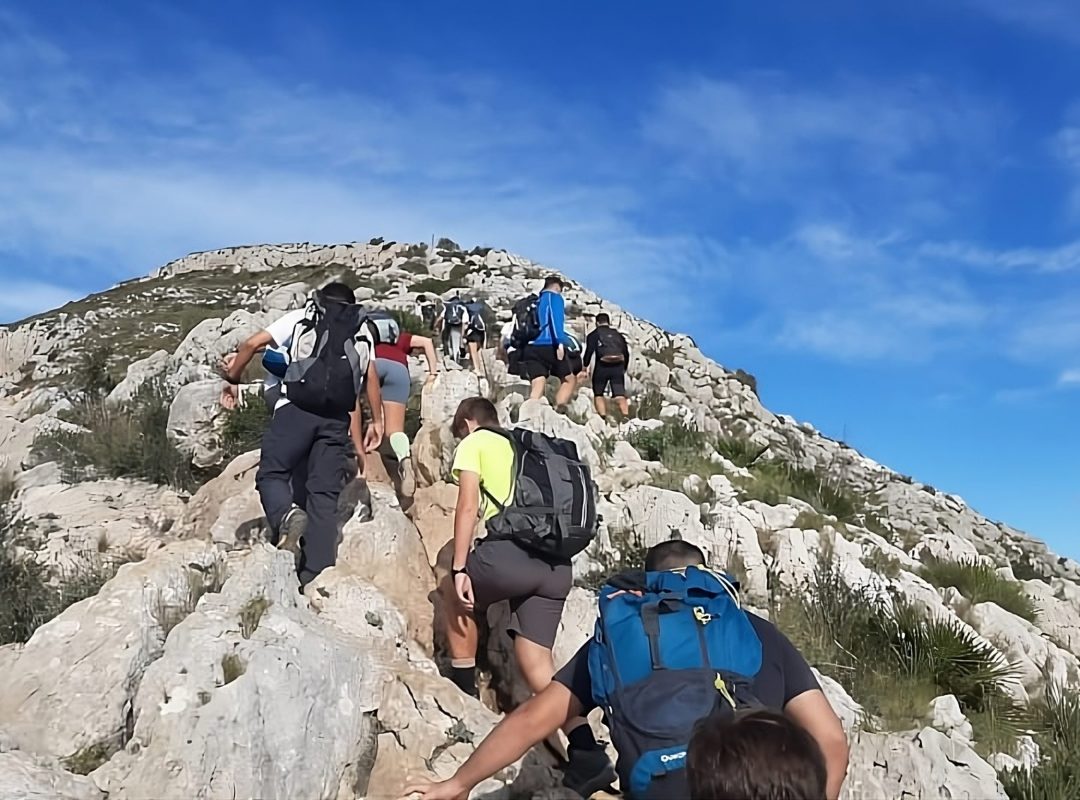
The professional outings for which the Certificate of professionalism of Guide for dry or aquatic canyons qualifies you are:
- Guide in hiking activities, low and mid-mountain mountaineering, low and mid-mountain hiking, Nordic snowshoeing.
- Monitor in camps.
The certificate of professionalism of Lifeguarding in Aquatic Facilities is a level 2 course, so in order to access it it is necessary to have the following qualifications:
- ESO diploma;
- Another Certificate of Professionalism of the same level or level 1 of the same family and professional area;
- Basic VET Diploma, VET Technician or Plastic Arts and Design Technician;
- Entrance exam to intermediate level training cycles.university entrance exam for people over 25 years old or 45 years old.
As this is a classroom course held at the Lope de Vega facilities, you will have at your disposal:
- Heated semi-Olympic swimming pool.
- Changing rooms with lockers.
- Complete sports facilities to complete training sessions.
- Smart classrooms with interactive whiteboards.
- Parking area within the facilities.
- Cafeteria
- Library
- WIFI Campus with Internet connection in all facilities.
- Homologated mountain areas;
- Climbing wall.
Dynamisation of activities
leisure time for children and young people
This certificate has a total of310 hours of training. Classes are held from Monday to Friday, in the afternoons, in the fully equipped classrooms. Lope de Vega sports facilities.
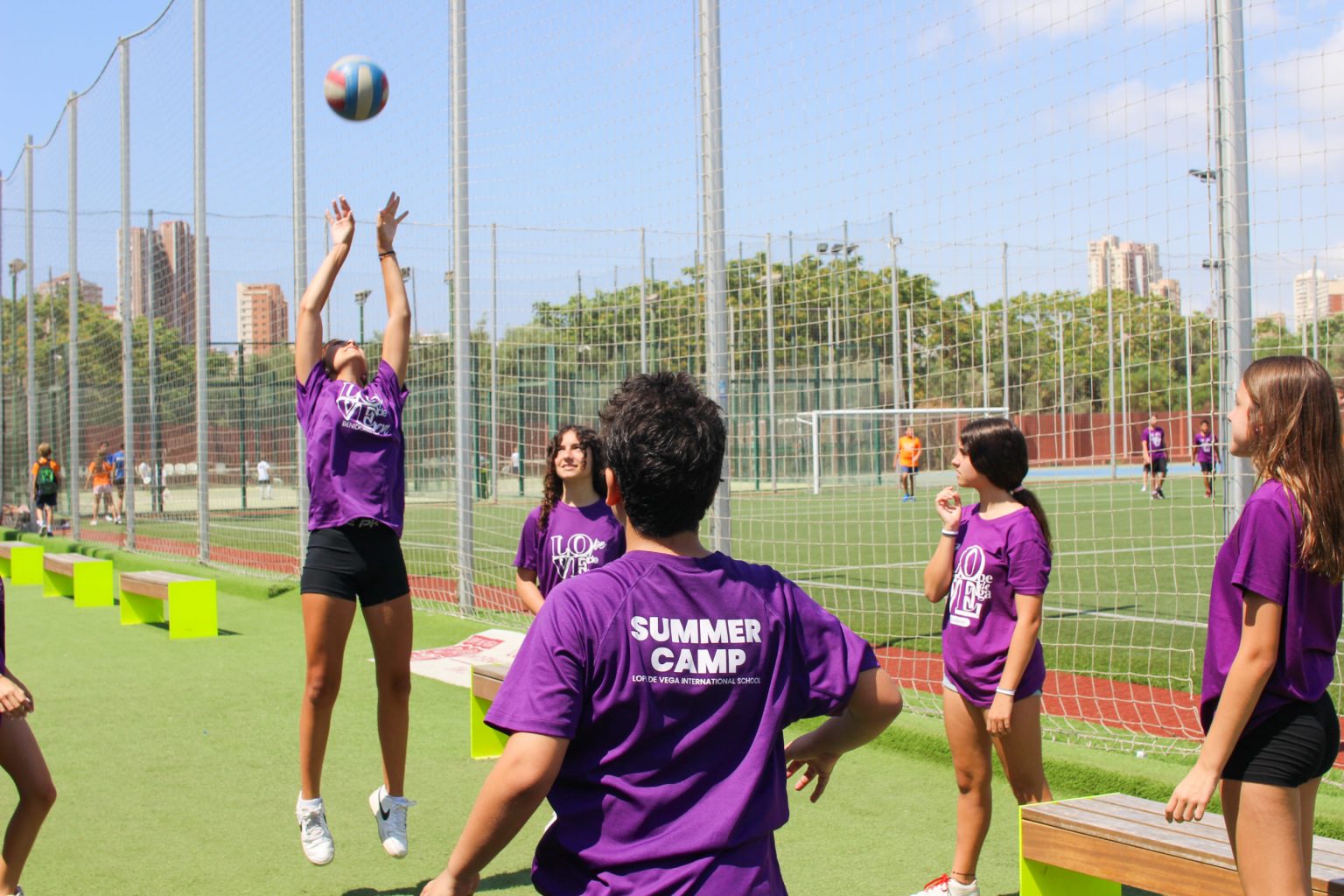
Dynamisation of activities
leisure time for children and young people
This certificate has a total of310 hours of training. Classes are held from Monday to Friday, in the afternoons, in the fully equipped classrooms. Lope de Vega sports facilities.
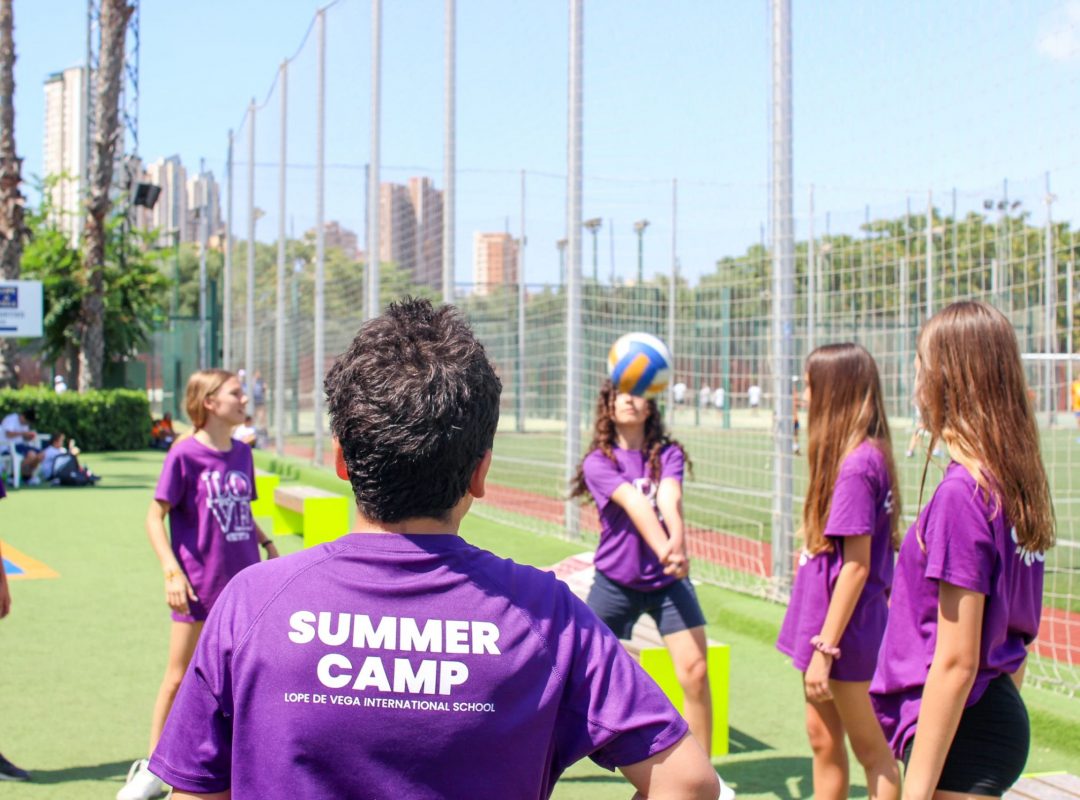
The professional outings for which the Certificate of professionalism of Guide for dry or aquatic canyons qualifies you are:
- Education and leisure time monitors.
- Monitor of children’s and young people’s educational free time.
- Monitor of camps, youth hostels, holiday camps, farm-schools, classrooms and nature schools.
- Monitor of activities in the school context.
The certificate of professionalism of Lifeguarding in Aquatic Facilities is a level 2 course, so in order to access it it is necessary to have the following qualifications:
- ESO diploma;
- Another Certificate of Professionalism of the same level or level 1 of the same family and professional area;
- Basic VET Diploma, VET Technician or Plastic Arts and Design Technician;
- Entrance exam to intermediate level training cycles.university entrance exam for people over 25 years old or 45 years old.
As this is a classroom course held at the Lope de Vega facilities, you will have at your disposal:
- Heated semi-Olympic swimming pool.
- Changing rooms with lockers.
- Complete sports facilities to complete training sessions.
- Smart classrooms with interactive whiteboards.
- Parking area within the facilities.
- Cafeteria
- Library
- WIFI Campus with Internet connection in all facilities.
Do you want to know more about professional certificates?
Fill in this form, we will attend you personally;




